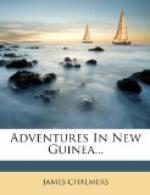A few mornings later, I found the natives sitting round rice; one said, “Come, we are waiting for you to bless the food.” They have seen our boats’ crews of Botu and Boera natives always asking a blessing. I said to them, “Cannot one of you ask a blessing?”
“No; wait until we learn, and you will see.” A good story is told by the captain of the Mayri. Oa their going to Aroma to relieve the teachers after the Kalo massacre, in the early morning they were pulling along the reef, and just as the sun appeared over the mountains, one of the Motu crew called on all to be quiet, rowers to lean on their oars, and then engaged in prayer, thanking God for watching over them during the night, and praying that He would care for them during the day, and that no unpleasantness might occur with the Aroma natives. All along this coast, and right away down to Elema as far as Bald Head, the Motu tribe has a wonderful influence, and in a few years excellent pioneers may be had from it. They must have been a terrible lot in the past. I have heard much from themselves of piracy, murder, and robbery, and all along here they tell terrible tales. A Motu chief in one of our meetings, speaking of the past and the present, concluded by saying: “Since the arrival of the foreigners (teachers), we have changed and will continue to change.”
An old chief, Aiio, from the Mekeo district, came in to see me, and brought me as a present a splendid head-dress, which is hung up by Kone in front of the tent for all to see. On giving him a present of salt, it was pleasant to see the old fellow’s expression of pleasure. He is anxious I should go inland as soon as possible; I tell him I must wait for tomahawks.
At seven o’clock on the morning of the 13th of June, I started to visit Madu, the chief of the Motu Lavao. We went up from the bight, a large saltwater creek, with dense mangrove on both banks,—a veritable bed of fever,—and anchoring our boats, we walked through the deserted village of Paitana and on for about a mile and a half to Motu Lavao. The path leads along a narrow tract of good country, with dense swamps on both sides. The village is large, with good houses kept nice and clean; but I can conceive of no more unhealthy locality—swamp all around. A number of people were down with




